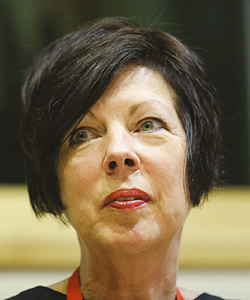 This year, the European Union and Energy Union face important legislative proposals on the European Union Emissions Trading System, Security of Supply, Energy Efficiency and Energy Market Design.
This year, the European Union and Energy Union face important legislative proposals on the European Union Emissions Trading System, Security of Supply, Energy Efficiency and Energy Market Design.
These proposals call on the European Union to resolve three major issues: the transition to a sustainable and decarbonised economy with increased energy efficiency, renewables and a smart, flexible, energy supply; the need to guarantee secure and stable energy; and the development of a functioning retail market.
In order to achieve these objectives, we cannot just consider energy as a commodity, but more importantly as a basic social right. The Energy Union should have the interests of EU citizens at its core and the energy transition should result in a more decentralised and democratic energy system - benefiting society as a whole. That is why I am particularly pleased that this year's EU Sustainable Energy Week will focus on consumers.
More immediately, in July the Commission presented a Communication entitled 'Delivering a New Deal for Energy Consumers', underlining the key issues facing our retail energy markets and the obstacles consumers face as the energy sector transforms throughout Europe.
Five years after the Third Energy Package, its aim of providing a truly competitive and consumer-friendly retail market has not yet been realised. Consumers are still paying too much for their energy bills and are stuck on outdated and expensive tariffs. We need to fight for more transparency and clarity on bills whilst making it easier for all consumers, including those who do not have access to the internet, to compare offers and switch energy suppliers free of charge. Similarly, we need to fight for a ban on unfair commercial practices, including aggressive marketing techniques over the phone and on the doorstep, often targeted at the most vulnerable and our elderly citizens.
To be successful, Europe needs to continue the transition from a centralised system based on fossil fuels to one which is decentralised, flexible and increasingly based on renewables. We need to make sure that citizens directly benefit and believe that consumers should be supported to take ownership of this transition through practices of energy self production and increased initiatives towards energy-efficiency. This includes reducing the administrative barriers to self-generation capacity and replacing lengthy authorisation procedures with simpler notification requirements. It also means promoting the development of demand-response and smart technologies while making sure that the most vulnerable and those who do not have easy access to information or technology are not left behind.
All these changes are underpinned by my desire to tackle and address the growing problem of energy poverty throughout Europe. Currently over 50 million citizens in Europe struggle to pay their energy bills and it is our collective responsibility to assist them. In 2016, no one should have to choose between heating, cooling and eating. I believe that we can only bring down energy bills if we coordinate our efforts at regional, national and European levels. Recently, in the Anti-Poverty Target Report, the European Parliament called on the Commission to develop a common definition of energy poverty. We are now waiting for action from the Commission and suggestions in the upcoming legislative package, including in the Energy Efficiency Directive, Energy Performance of Buildings Directive and Energy Market Design.
The next step is to ensure that the Parliament's recommendations are incorporated into all the relevant upcoming legislative texts - thus ensuring a genuine New Deal for citizens. In 2016, we must ensure that consumers are central to the energy transition and empowered throughout the process of change.